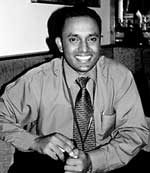
| New Life for ‘Young Entrepreneurs’ from USAID Award-winning bank executive, professional event announcer, web systems developer, and television newsreader, 24-year-old Siddeeque Ahmad is a young entrepreneur if ever there was one.
Ahmad said that his remarkable success at such an early age was a direct result of his participation at the Young Entrepreneurs of Sri Lanka (YESL) programme while in college. The YESL programme teaches students about business by assisting them to form their own school-based companies, complete with boards of directors and stockholders, USAID said in a statement. As a YESL participant in the late 1990s, Ahmad, along with some classmates, took note of the many functions, clubs and societies at the school, and established a company to cater specifically to the needs of those clients. With every event by those clubs and societies, Ahmad’s business became more sophisticated and successful. “Find a need and fill it – YESL taught us that’s what business is all about,” he said. “It’s been our guiding principle ever since.” The programme encouraged Ahmad to cultivate his skills as a compere, and his classmates in their respective specialties. According to YESL regulations, after graduation the partners liquidated the school company, which they re-established as a diverse set of other enterprises. Ahmed later became certified by the Chartered Institute of Marketing (CIM), and he has nearly finished a Master’s program. “In Sri Lanka, young people think they must graduate, go to university, and find a job,” he said. “YESL broke that barrier. Thousands of graduates of the programme realize that nothing stops us from looking at business as soon as we get out of school.” Since 1998, the U.S. Agency for International Development (USAID) has supported YESL, and seen it grow from 1,600 students in nine schools to 35,000 students in 350 schools last year. New support from USAID will permit expansion to a projected 45,000 participants next year, and as many as 10 times that over the next seven years. A new strategy pushes the programme into rural areas, establishes a permanent headquarters, and develops a plan for private sector funding. “Today’s students are Sri Lanka’s business leaders of tomorrow,” USAID Director Rebecca Cohn said at a recent ceremony held to mark the revitalized programme. “Through YESL, schools help students understand the importance of market-driven global economies and the link between the country’s economy and their own future.” YESL not only trains youth to be entrepreneurs, but also teaches them about corporate social responsibility. The programme addresses the importance of taking responsibility for the communities in which they operate. Becoming sensitive to community needs helps the all-around development of YESL participants, and grooms them to become better corporate citizens later in life. YESL Vice President and Director Pathmasiri Dias said that of the four million students in school every year, only a small percentage would eventually enter a Sri Lankan university, which necessitates a change in attitude about the definition of success. “When we started the programme we knew nothing
about business,” 17-year old Pramod Kiriella from St. Joseph’s
College said at the ceremony. “Now we’re ready to take
on the world.” |
| || Front
Page | News
| Editorial
| Columns
| Sports
| Plus
| Financial
Times | International
| Mirror
| TV
Times | Funday
Times || |
| |
Copyright
2006 Wijeya
Newspapers Ltd.Colombo. Sri Lanka. |
